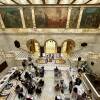The great pandemic of 2020 may be a steep slide for our economy, but some see it as an unprecedented opportunity to radically transform our aging transit infrastructure and lead to a less car-centric 21st century.
At an online forum hosted by Liveable Streets and Transportation for Massachusetts, Congresswoman Katherine Clark used a phrase from the Depression era to describe what needs to be done to fix the state's long-neglected transportation system.
“All these areas that are under-funded," she said, "I hope we can be more in the ‘New Deal’ mindset when we finally get back to legislating around these bigger areas.”
As FDR responded to the Great Depression by pumping federal dollars into the economy for public works projects and jobs, Clark said she thinks it's time to do the same now.
“This would be a very good time to make the kind of investment — and the size of investment — that we haven't been able to find the political will to do. But now we can really achieve not only great things for our infrastructure but we can also do it in a way that can help create jobs,” she said.
Clark said she's encouraged by the strong bipartisan support for the $25 billion already approved by Congress for transportation as part of the CARES Act. She said there are plans to include additional funding for transit in future recovery packages. About $1 billion of that money is headed to Massachusetts, with $827 million destined for the MBTA.
Beth Osborne, director of the advocacy organization Transportation for America, said the $25 billion is inadequate. She said more like $38 billion is needed to keep the trains, buses and subways running in major metro areas through the pandemic.
But Clark and Osborne are looking beyond providing operating money for public transit systems. Clark is optimistic that it will be possible to make the kind of major infrastructure improvements President Trump has talked about, but that have not materialized. That includes money to rebuild the nation's crumbling roads and bridges, making public transit safer and less polluting.
And Osborne said her polling shows that an overwhelming number of people want things fixed before anything new is built; and if anything new is built, there must be assurances it will be maintained.
Osborne added that the more immediate need is making sure the nation's aging transit systems are rebuilt, to allow the neediest people to get where they have to go.
In the past, she said, federal policy has been all about moving as many people as quickly as possible, and that's why federal transportation policy has historically favored building highways.
About 80 percent of federal dollars has gone to new highway construction, while only 20 percent has been spent on public transit. Osborne said it’s time to rethink those priorities.
“We're seeing probably a long-term economic challenge that is not going to lead to the same traffic loads that we were expecting, so maybe a massive highway expansion to deal with future traffic is not well-timed right now. Maybe a project that we weren't considering, like making more space for people out of doors while social distancing, is,” she added.
For instance, she suggested expanding what many cities are already doing, like redesigning city streets, widening sidewalks for pedestrians and designating lanes to speed up bus service and make cycling safer.
Stacy Thompson, executive director of Liveable Streets, said as we emerge from the COVID-19 pandemic, one thing people who use mass transit will definitely need is more space.
“We are going to need more social distancing on mass transit to restart the economy. We need to get people on transit, but we're going to need space, more PPEs, we're going to need more frequent buses and trains,” she said, especially in inner cities. “We know in Massachusetts where the hot spots are. It’s our communities of color. And they're also the communities that have the worst sidewalks, that have the least transit access, and we need to be putting our resources today to make sure our essential workers, our most impacted people, have what they need.”
Chris Dempsey, director of Transportation for Massachusetts, agrees that for too long transportation policy has favored people who have cars over those who don't, and public transit has been chronically underfunded. The result, he said, has been severe traffic congestion. The state has made recent progress, he said, investing in measures that lessen congestion by discouraging driving and encouraging the use of public transit.
Dempsey was behind an effort on Beacon Hill to secure long-term reliable funding for transportation with measures that would raise the gas tax, increase tolling and have Massachusetts join the Regional Transportation Climate Initiative to reduce the use of fossil fuels. That all came to a halt when COVID-19 arrived.
Although he acknowledged the federal funds are needed in this emergency, Dempsey cautioned that all those federal transportation dollars might be a disincentive for state lawmakers.
“There's a risk that the largesse from the federal government, which is very much appreciated in this moment of crisis, will allow the state to continue some of the bad habits that it's had over many decades.”
Dempsey said it’s crucial that the effort to adequately fund transit at the state level continue, since pandemic-related federal aid will eventually end.
Clark said the massive investments Congress is making to restart the economy in the wake of COVID-19 provides a unique opportunity.
“We just need to work together to address this public health crisis and really turn to the infrastructure needs of this country," she said. "We're going to need our best minds in transportation to be thinking about how we can tackle some of the problems that have been so hard to solve and so hard to fund. We do have that chance."
This article has been updated.





